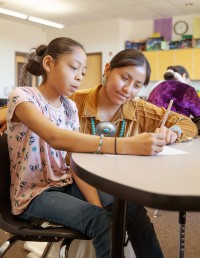A Know-Your-Rights Guide for Parents and Guardians is Now Available
FOR IMMEDIATE RELEASE
August 10, 2021
Contact: [email protected]
In-person instruction has returned to public schools in California, but that doesn’t mean students are required to be on campus. Students and families with concerns about health or safety can still enroll in an off-campus, online option known as independent study.
However, key aspects of what school districts must offer in distance learning for the 2021-2022 school year -- especially in regard to live instruction and interaction -- have been drastically reduced.
To help parents and guardians, as well as students, make informed choices, the National Center for Youth Law (NCYL), Children Now, ACLU Foundations in California, and other education-focused organizations are today releasing a know-your-rights guide to distance learning in the state’s public school system for the 2021-2022 school year.
Under the new state rules, school districts are likely to offer a version of independent study, which has long been available to students as an alternative learning option.
“Students we work with — particularly those from low-income communities of color — have wanted to explore distance learning through independent study to keep themselves and their families safe during the continuing pandemic,” said Joy Hernandez, program manager at NCYL. “This guide can help them and their caregivers make empowered decisions.”
Getting a student into an independent study program for the new school year is not automatic, but programs are available to “students whose health would be at risk by returning to school in-person,” the guide says. Almost all school districts in the state will offer the programs. Those that can’t have been directed to partner with districts that can take the students.
An exception is charter schools — they are not required to offer any form of distance learning. The guide suggests that parents or guardians of a child attending a charter school that does not offer a needed remote learning program switch to a different charter school or to a school district offering a program.
The independent study programs are required to offer at least some live instruction, sometimes on only a weekly basis depending on the grade level. But there is no requirement for online interaction with other students.
The know-your-rights guide, which includes a checklist of key questions parents or guardians can ask school districts when deciding on learning options, is available in English and Spanish.
“Es importante que los padres conozcan sus derechos cuando se trata de la educación de sus hijos, especialmente si sus hijos son apredices de inglés or tienen discapacidades,” said Ana Mendoza, staff attorney with the ACLU Foundation of Southern California.
Other organizations supporting the guide are the Alliance for Children’s Rights, California PTA, Californians Together, Loyola Law School Youth Justice Education Clinic, Parent Institute for Quality Education (PIQE), Parent Organization Network, and Public Advocates Inc.
“After a challenging year of distance learning for our families, students are finally returning to the classroom: yet, not every family is ready to transition to in-person learning,” said Lucero Chavez, policy associate with PIQE. “It is vital that parents are aware of the options available through independent studies to make informed decisions about their student’s wellbeing and academic success. Informed families are empowered families.”
In addition to information about the independent study programs, the know-your-rights guide provides critical information on the rights of English learners, students with disabilities, foster youth, and houseless youth.





